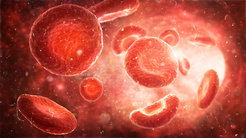Cancer cells with mutations in the JAK2 signaling pathway survive therapies using the YBX1 protein

Myeloproliferative neoplasms (MPN) is a chronic cancers of the hematopoietic system. In simple terms it is a cancer of blood cells. This can be caused by mutations in JAK2 protein, because this important protein regulates cell division and differentiation. In order to heal the diseases, drugs are needed that prevent the diseased cells from proliferation in the long term. Patients with JAK2 mutations are treated with JAK inhibitors but the treatment often fails. With the currently used drugs, there are some cells that are either resistant to the drugs in advance or get used to the drug. Therefore, these cancer cells continue to divide unintentionally. Scientists around Matthias Mann, from the MPI of Biochemistry together with scientist from the Leibniz Institut on Aging in Jena, have investigated the mechanism that enables cancer cells to survive a drug treatment. To do this the researchers have analyzed signal switches, i.e. phosphorylation changes that activates proteins in the cancer cells. Using phosphoproteomics method, the scientists have investigated the global activation of signaling pathways in cells. First author of the study Ashok Kumar Jayavelu explains: "The mutation of the JAK2 protein leads to the overactivation of the JAK2 signaling pathway and thus stimulates the division of the cells. In these cells we found that the splicing factors phosphorylation is important. Especially the splicing factor YBX1 phosphorylation is required for the JAK2 cells upon inhibitor treatment.“ The researchers were able to see that the ERK signaling pathway is activated and this needs YBX1. In order to treat the cancer cells with the JAK2 mutation, the scientists combined JAK and ERK inhibitors. Matthias Mann summaries: „This finding opens a new door for new treatments of JAK2-mutated induced MPN.“ The study was published in Nature.
Original Publication:
A.K. Jayavelu, T.M. Schnöder, F. Perner, C. Herzog, A. Meiler, G. Krishnamoorthy, N. Huber, J. Mohr, B. Edelmann-Stephan, R. Austin, S. Brandt, F. Palandri, N. Schröder, B. Isermann, F. Edlich, A.U. Sinha, M. Ungelenk, C.A. Hübner, R. Zeiser, S. Rahmig, C. Waskow, I. Coldham, T. Ernst, A. Hochhaus, S. Jilg, P.J. Jost, A. Mullally, L. Bullinger, P. R. Mertens, S.W. Lane, M. Mann, and F.H. Heidel: “Splicing factor Ybx1 mediates persistence of Jak2-mutated neoplasms”, Nature, November 2020
DOI: https://doi.org/10.1038/s41586-020-2968-3












